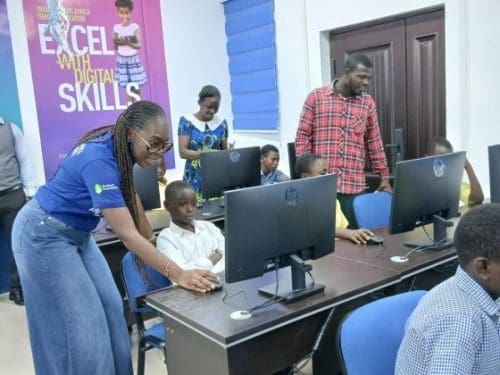Ghana Code Club has unveiled an ambitious training program for educators under its partnership with Ecobank Ghana, designed to equip teachers and facilitators at newly launched digital centres with advanced technology teaching capabilities. The initiative aims to transform how coding, robotics, and artificial intelligence are taught across Ghana’s educational landscape.
Ernestina Appiah, Founder and CEO of Ghana Code Club, announced the program during the commissioning of the Takoradi Digital Centre alongside other inclusive learning hubs, including a specialized centre for deaf learners. The announcement signals a significant expansion in the organization’s mission to democratize technology education across diverse learning communities.
Through the training initiative, educators from participating centres will receive hands-on instruction in multiple cutting-edge teaching methodologies. These include assistive digital learning methods, micro-based and block coding techniques, robotics instruction, and AI teaching resources. The comprehensive approach empowers teachers to introduce complex technology concepts through engaging, accessible methods that emphasize creativity, teamwork, and problem-solving skills.
“These digital centres go far beyond computer skills,” Appiah explained during the commissioning ceremony. “They will nurture a generation of young innovators and problem solvers who can apply technology to address real-life challenges, from community development to entrepreneurship.”
For special-needs education, Ghana Code Club is pioneering inclusive teaching tools specifically adapted for deaf learners. The organization is introducing sign language adapted coding visuals, sensory learning activities, and AI demonstrations designed to transform how deaf students experience technology education. This tailored approach ensures that Ghana’s digital transformation leaves no learner behind, regardless of physical abilities.
Appiah emphasized that the centres serve a dual purpose: helping teachers gain confidence in delivering inclusive lessons while enabling students to discover technology as a tool for self-expression, creativity, and empowerment rather than something distant or foreign to their daily lives.
She praised Ecobank Ghana for its sustained investment in digital literacy across the country, describing the bank’s vision as transformative for Ghana’s educational sector. “Your dedication to building inclusive digital communities is not only transforming classrooms, it is shaping the future of Ghana’s digital innovation story,” she remarked.
The collaboration between Ecobank Ghana and Ghana Code Club represents a growing model for public-private partnerships driving inclusive education in Ghana. By combining corporate resources with specialized educational expertise, the partnership aims to equip Ghanaian youth to compete on the global stage in robotics, AI, and digital innovation.
Ghana Code Club has trained over 120,000 children and equipped approximately 35,000 teachers since its founding in 2015. The organization operates 19 centres across Ghana, focusing particularly on reaching girls and underserved communities. Appiah, who was named to the BBC 100 Most Inspirational Women list in 2015, founded the initiative through her registered NGO, Healthy Career Initiative.
The latest digital centres were equipped with 26 computers and accessories, including furniture for students and tutors. The Tetteh Ocloo School for The Deaf in Greater Accra and Bishop Sam Memorial Basic School in Takoradi became the most recent beneficiaries of the Ecobank Day initiative, the bank’s annual group-wide social impact program.
As Ghana continues advancing its digital transformation agenda, initiatives like this partnership demonstrate how targeted investments in teacher training and inclusive infrastructure can create lasting impact. The focus on equipping educators with robotics and AI teaching skills positions Ghana’s next generation to participate meaningfully in the global digital economy while addressing local community challenges through technology innovation.
Source: newsghana.com.gh











